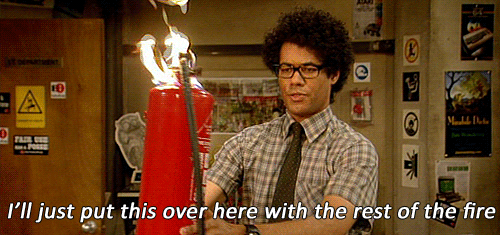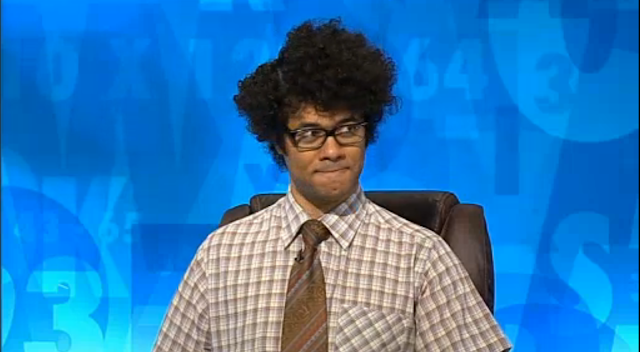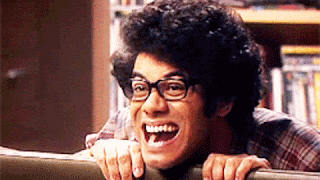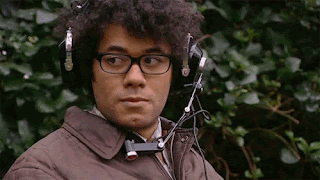As I'm sure you've all managed to gather by now, February is Black History Month, and in honor of that we've been doing a series of articles for Masculinity Mondays and Strong Female Character Fridays on the representation of African-Americans in popular culture. So far on the dude side of things we've talked about what happens when harmful stereotypes are reinforced by otherwise progressive stories, the casual subversion of tropes about black men in power, and black excellence versus an apathetic fan base. Today we're going to look at how pop culture interprets black nerds (or blerds as someone much cleverer than me has put it), and the ways in which this depiction still has a long way to go.
Our topic today is a lot lighter than usual, and you'd be forgiven for thinking that there's not much meat on this bone. Anyone who's seen the show can tell you that The IT Crowd might be one of the funniest sitcoms of all time (seriously), but it's not exactly deep.
And that's true. It really isn't. Based around a very loose premise - computer illiterate people person (Katherine Parkinson) is put in charge of the IT department at a ridiculous corporation, hijinks ensue - the show is really more about comedy itself than any actual plot. Sure, there are four main characters who appear in most of the episodes, but they really don't have much in the way of arcs.
It's not a popular enough show for me to assume that most of you have seen it, though you definitely should give it a shot, but rather than get bogged down in explaining the premise, let's get right to the heart of today's issue: Moss (Richard Ayoade) and his perfect example of how pop culture feels about black nerds.
Moss is one of the main character in The IT Crowd. An IT grunt working in the basement of a giant corporation, Moss feels understandably frustrated with his life and with the very little respect anyone has for what he can do. This is especially understandable given that Moss is kind of a genius. His computer skills are the kind of nebulously explained sitcom skills that mean he can do pretty much anything with a computer and no one thinks it's weird.
Well, that's not entirely true. People think lots of things Moss does are weird and lots of things about Moss are, objectively, incredibly weird. But in traditional television fashion, his computer skills really aren't one of those things.
Moss really is a fascinating character, though. While he does fit perfectly the stereotype about an awkward, lonely, shy computer nerd with no experience relating other people, Moss is actually much more complex than that. Or maybe not much more complex, but sufficiently interesting.
In other words, Moss is just as strange as everyone else on this show, which is to say very. He gets a lot of his own plotlines, which is nice, and overall is a very funny character on a very funny show. Nothing more to see here, right?
Or not. See, the problem I have when talking about this show is that I absolutely adore it in all areas except for one, and that's how the show deals with Moss' race. And by that I mean how the show straight-up doesn't deal with Moss' race.
As I'm sure the pictures have tipped you off, Maurice Moss is a black man. Richard Ayoade, the actor who plays him (who is also a super cool and interesting director and funny person) is of Nigerian descent, born to parents who emigrated to Britain in one of the big emigration booms of the 1970s. Since we tend to be able to extrapolate actor parentage into character parentage, we can generally guess that Moss has a similar lineage. This isn't out of the realm of possibility - just look at how casting Tyler Posey, who has Hispanic heritage, in Teen Wolf eventually impacted the story. Only it never comes up on the show. Not once.
At first I figured that this was a good thing. Like I said above, The IT Crowd is a light funny show with very little by way of character development or even background. Moss' race isn't a subject that seems like it would immediately come up, so when it utterly fails to you almost don't notice. The problem with this, I have realized, is that by never mentioning Moss' race or even acknowledging that he is not white, the show perpetuates an idea that black nerds aren't really black.
 Stay with me here.
Stay with me here.On the show, Moss is defined first and foremost as a nerd. His identity as a black man in Britain is never relevant to the plots, even when it seems like it might be. He's not black, he's a nerd, and this plays into the belief that black men can't be nerds. That something about being a nerd makes them not black. This is mentioned directly in Dear White People, when the character Lionel (Tyler James Williams) talks about not feeling black: "I listen to Mumford and Sons and watch Robert Altman movies . Do you really think I'm black enough for the Union?"
There's a disconnect between black culture and nerd culture. I'm not the first person to notice it (like, even remotely), and I don't know enough here to talk about where it stems from. I just want to look at what it does to our pop culture.
Because Moss is never explicitly non-white, despite being, you know, obviously not white, his race becomes an afterthought. Now I'm not saying that it should be the whole thought or anything, but there is a lot of value in having a character, like Moss, who can be both black and a nerd. Like, at the same time even.
We do have characters like this - Alec Hardison (Aldis Hodge) from Leverage is a prime example - but they are few and far between. In general, our culture acts like being a nerd somehow is a way to be not black, which raises a lot of very alarming suggestions about how we define being black.
Moss is very neat and tidy, always wears a button up shirt and tie, carefully parts his afro into the classic nerd side-part, and never raises his voice. Compare this to how Hollywood generally portrays black men: messy and loud and "not good at taking care of themselves". Moss is very intentionally different from how we imagine black men in pop culture, but by making him different without acknowledging this we get a character with no history or culture. Even worse, this dichotomy suggests that if there's one thing that makes you not black anymore, it's being smart.
Yikes.
Now I want to remind everyone now that I don't think it's impossible to be a black nerd. In fact I know it's not. But I do find it really troubling that culturally we seem to expect black nerds to fit into a pigeonhole that denies them their race. It's like you can either enjoy science fiction or be black, and we all know that's a false dichotomy.
What bothers me about Moss is not that they handled his race badly but that they didn't handle it at all. It implies that the writers or producers or somebody figured that if Moss was a nerd they didn't have to talk about him also being a black man. In doing this they reinforced stereotypes about the black community being "stupid" and "uneducated", and they cost us a potential example of really healthy and interesting black masculinity.
Oh right. How does this all tie back in with masculinity?
Well, black masculinity in pop culture is, as we've already discussed, frequently reduced down to a set of really problematic stereotypes. Black men are disproportionately portrayed as criminals or violent and dangerous people. They are rarely given the chance to be center stage and even more rarely allowed to be funny or smart or weird.
Black men in American pop culture especially aren't often allowed to express any deviation from this norm without being mocked by the other characters. This mocking, in turn, only reinforces the idea that black men really have nothing to offer the world.
Maurice Moss is a black man - that's pretty clear - but the lack of recognition for that fact in the story is a bad thing. The show would have been better for it - think of all the amazing plotlines you could have - but it also would have meant a lot to black men and women watching the program. I mean, it would be a way to say that yes, you can be black and smart and that's fine. Instead, the message the show sends is that you can be black or smart, not both at the same time. And that's not what we want people hearing.
If you get nothing else today, I hope you see this: The stories we tell matter and they often matter in ways we never considered. It is always worth taking a moment to be mindful about the choices in your writing or in your words or even in your actions as you go about your life. It always seems to matter so much more than we think it does in the moment.
 |
| I still love The IT Crowd though. |






Heya,
ReplyDeleteWhile I don't disagree with where you are going with this, I think part of the reason they don't acknowledge Moss' race is that this is a British show, and race is a lot less of a problem/hot button topic there than it is here. In Britain things tend to be drawn across class lines rather than race lines. John Boyega talks about this in an interview he did for "Attack the Block.", where the British see his character as a young, lower class man, in the USA we see him as a young, African-American man. Doesn't make your point any less valid, but it's something to consider.
Thanks,
TGnome
Oh man. Yeah, you have a very good point here. While my point stands as this show is translated into an American cultural context, that's a really solid point about British culture having a fundamentally different understanding of race. Thank you for pointing that out!
DeleteI'm of mixed race and I got to say I like the idea of them not mentioning his race. I actually prefer it. It's not that I don't have pride in being black. But why should white people be the only ones to go through life without having their race noted on a tv series or anything else for that matter. It's not a white thing to live an uninterrupted life, that's a right all humans should have. So just because they don't mention his race, does not make him white.
ReplyDeletethat’s exactly what I was thinking – you put it into words far better than I ever could :)
DeleteA majority of the people in the UK would just see him as a british man, and he's either a posh british man like Trevor McDonald or Richard Ayoade, or he has more humble beginnings like Idris Elba or Daniel Kaluuya (using black men for examples here). I'm not saing there isn't racisim or bigotry in the UK, but as a Irish white guy from the north of Ireland, i'd just be as likely to experience the bigotry as any colour over there.
ReplyDeleteESCORT
ReplyDeleteESCORTS
FEMALE ESCORTS SERVICE KOLKATA
KOLKATA FEMALE ESCORTS SERVICE
INDEPENDENT ESCORTS SERVICE
INDEPENDENT ESCOTRTS SERVIC KOLKATA
KOLKATA INDEPENDET ESCORTS SERVICE
RUSSIAN ESCORTS SERVICE KOLKATA
RUSSIAN ESCORTS SERVICE
KOLKATA RUSSIAN ESCORTS SERVICE
FOREIGN ESCORTS SERVICE IN KOLKATA
INDEPENDEN FOREIGN ESCORTS SERVICE
ESCORT FOREIGN SERVICE IN KOLKATA
SEXY FEMALE ESCORTS SERVICE
SEXY MODEL ESCORTS SERVICE
MODEL ESCORTS CALL GIRLS
MODEL ESCORTS CALL GIRLS SERVICE KOLKATA
CALL GIRLS SERVICE KOLKATA
CALL GIRLS IN KOLKATA
KOLKATA CALL GIRLS
KOLKATA CALL GIRLS
CALL GIRLS KOLKATA